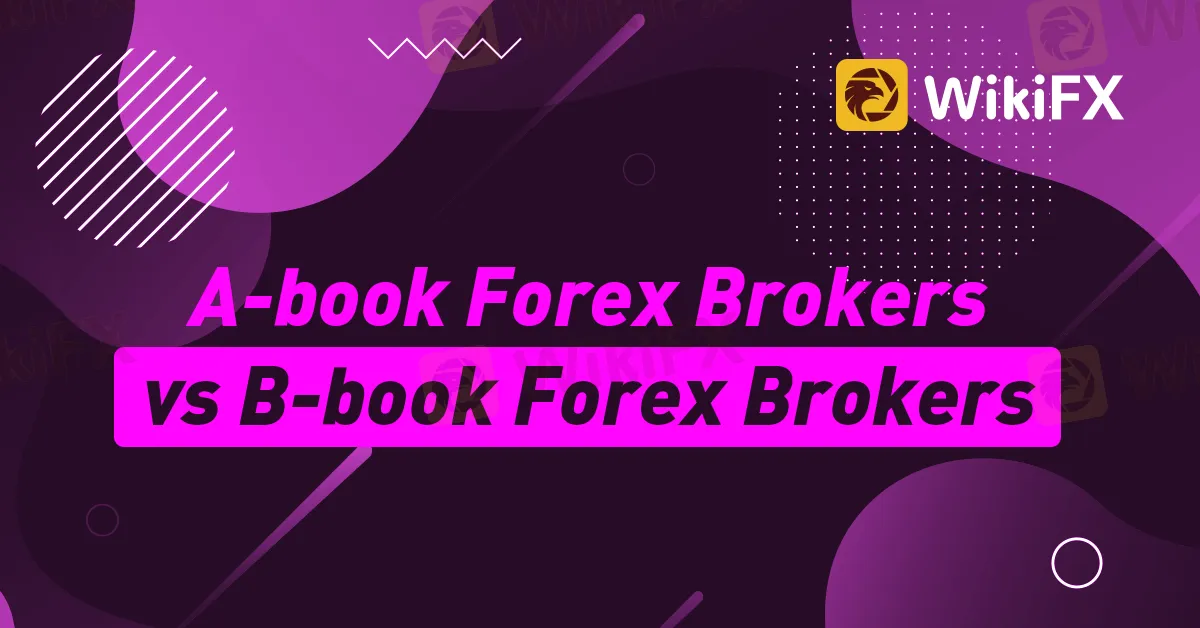简体中文
繁體中文
English
Pусский
日本語
ภาษาไทย
Tiếng Việt
Bahasa Indonesia
Español
हिन्दी
Filippiiniläinen
Français
Deutsch
Português
Türkçe
한국어
العربية
A-book Forex Brokers vs B-book Forex Brokers
Abstract: In the forex world, you may see some brokers called "A-book" and others called "B-book" brokers. In this article, we will analyze what these two types of brokers are and what the differences look like.

About A-book and B-book
To understand what A-book and B-book brokers are, we must first understand A-book and B-book. A-book and B-book refer to the way that brokers distinguish and separate their clients based on the degree of risk associated with each clients order. There is no exclusive A-book forex brokerage or B-book forex brokerage.
About A-book forex brokers and B-book forex brokers
These are the forex brokers that routinely pass on their clients‘ orders for fulfillment in the interbank market or other external execution venues. They could sum up the traditional definition of a brokerage: they source the liquidity for their clients’ orders and pass these orders on for other entities to fulfill. They act like facilitators of these transactions. The closest brokerage model to the A-book forex brokerage model is the STP brokers. However, this is not to say that market makers do not routinely carry out A-book order fulfilments.
Now, what about the B-book forex brokers? As you may have guessed, the market makers always have the B-book system in operation. Remember the 95% of traders who are not usually profitable as forex traders? Well, these are the traders lumped into the B-book liquidity bucket for in-house order fulfillment by the brokers dealing desk. The B-book forex brokers routinely use their in-house dealing desks to fulfill such orders, usually by taking a counterparty position to the trades of these clients.
Difference between the two
The difference between the A-book and B-book forex brokerage model is pretty simple. The A-book utilizes interbank market executions for clients orders, while the B-book process leads to internal order fulfillment without the usage of the interbank market.
A-book: You are trading with the banks and you have various options at transparent pricing. The broker provides the software and access to the interbank market.
B-book: You are trading with the supposed facilitator.

Disclaimer:
The views in this article only represent the author's personal views, and do not constitute investment advice on this platform. This platform does not guarantee the accuracy, completeness and timeliness of the information in the article, and will not be liable for any loss caused by the use of or reliance on the information in the article.
Read more

Geopolitical Events: What They Are & Their Impact?
You've heard many times that geopolitical events have a significant impact on the Forex market. But do you know what geopolitical events are and how they affect the FX market? Let us learn about it today.

Why Do You Feel Scared During Trade Execution?
Trade execution is a pivotal moment for traders. It is when analysis turns into action, and potential profits or losses become reality. However, for many traders, this moment is accompanied by fear. Why does this happen, and how can you address it?

WikiEXPO Global Expert Interview: Simone Martin—— Exploring Financial Regulation Change
In the midst of financial innovation and regulation, WikiGlobal, the organizer of WikiEXPO, stays abreast of industry trends and conducts a series of insightful and distinctive interviews on pivotal topics. We are delighted to have the privilege of inviting Simone Martin for an in-depth conversation this time.

What Are The Common Types of Unregulated Forex Brokers?
Protect your investments from unregulated forex brokers with these tips. Learn about red flags, scams, and how the WikiFX app ensures safe trading experiences worldwide.
WikiFX Broker
Latest News
Geopolitical Events: What They Are & Their Impact?
Top 10 Trading Indicators Every Forex Trader Should Know
Why Do You Feel Scared During Trade Execution?
Currency Calculator


